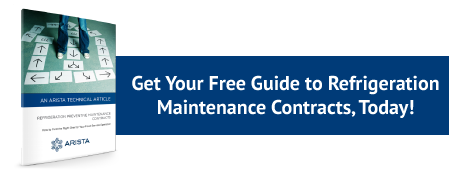New York City’s Restaurant Week is fast approaching. Each year New Yorkers and tourists flood the city’s restaurants for a chance to taste what might normally be beyond their budget or their pallette. If you’re a restaurant owner that could mean a huge boon for business. But if your refrigeration equipment fails, all those bang-for-your-buck meals won’t mean much. So, in advance of restaurant week, we’ll be posting great tips and resources on how to keep your equipment (and your head) cool!
As a restaurant owner, your refrigeration equipment is both your best friend and your worst nightmare. Without your coolers, chillers and freezers, you’d be serving lukewarm drinks, wilted salads and melted ice cream. Let’s face it, without them you wouldn’t be in business at all. And that’s exactly the problem: when they break down, your business quickly comes to a screeching halt.
If it’s happened to you, you know that refrigeration equipment failures can cost you up to thousands of dollars in business in a very short period of time. Not to mention the exorbitant cost to get a repair technician there within an hour on a Sunday before your Baked Alaska is reduced to a puddle. What would you do to avoid this expense and hassle? It’s not as difficult as you may think. All you need to do is regularly maintain your equipment.
There’s even an added bonus for doing preventative maintenance: lower energy bills. Did you know that refrigeration equipment can account for as much as 50 percent of your restaurant’s total power usage? When your systems are regularly cleaned and serviced, you can save between 5 and 10 percent on energy costs.
Refrigeration Maintenance To-Do List
Here’s a handy checklist of the items that need to be taken care of to keep your coolers, freezers and chillers operating reliably. You can do the everyday tasks yourself, but most of the others will require the expertise of a professional. How often these tasks need to be done may vary depending on your system load and the demands of your business. Consult with a qualified refrigeration service company for more information.
Every Day or Weekly
- Check temperature and defrost frequency settings. If the temperature is set too high, your food will spoil. If the temperature is set lower than necessary, the unit needs to work too hard and can shorten the life of your system. The same goes for defrosting more often than needed.
- Keep the area around equipment clear. Air flow blocked by debris or stacks of stuff can put a strain on the unit, causing it to run inefficiently and increase power consumption.
- Make sure employees turn out the lights in walk-in coolers and freezers. Not only do the lights drive up your electric bill, but they actually generate heat that forces your equipment to work harder to keep it cool. A best practice: use fluorescent lights that generate less heat inside coolers and freezers.
- Clean the interior. Remember not to use steel wool, bleach or caustic chemicals which can damage the finish. Be sure to consult the owner’s manual and follow manufacturer’s instructions.
Every Month
- Check for cold air leaks due to worn parts, cracks or punctures. When hinges, latches, strikes, gaskets or seals are in poor condition, the door of your units may not be airtight. Test the door gasket by closing a dollar bill in the door. You should feel some resistance when you pull on it; if it slides out easily the door is not sealing properly. Hinges should be regularly lubricated. Cracks or holes in the exterior walls will also cause the unit to lose cool air and need to work harder to replace it, using more power and causing additional wear and tear on the parts. If parts need to be replaced, call in a professional who can install more efficient versions such as automatic spring hinges.
- Inspect and clean each unit’s condensing and evaporator coils. A build up of dirt and grime impedes the flow of through heat through the coils which causes your unit to lose efficiency. This should be done with a commercial condenser coil cleaner. You could attempt this yourself but it is recommended to have this done by a professional.
- Clean fan blades. Dirt and grease on the fan blades causes drag that slows down the motor. Again, it’s best to trust the experts to take care of this.
At Least Twice Per Year
Schedule a visit from a refrigeration service expert to do a detailed inspection, cleaning, and tune-up of all your refrigeration equipment, including the tasks below and those on the monthly list. Leave these tasks to the professionals who know what problems to look for. Also, attempting to do repairs yourself could void your equipment warranty.
- Inspect all parts for wear. A refrigeration expert can spot degrading parts and replace them before that cause the entire unit to fail.
- Check compressor operation.
- Check suction line insulation.
- Check operation of the motor.
- Check refrigerant levels.
- Check electrical connections.
- Clear drain lines.
- Disassemble and thoroughly clean ice makers.
- Calibrate thermometers.
To prevent breakdowns that cost you business, and save on energy costs in the process, commit to a preventative maintenance program for your refrigeration equipment. Consult a qualified refrigeration service company like Arista to put together a customized maintenance plan for your restaurant.
To learn more about choosing a combined preventative maintenance program for you kitchen, refrigeration and HVAC services, download our guide to HVAC Refrigeration Preventative Maintenance: How to Choose the Right One for Your Infrastructure.

